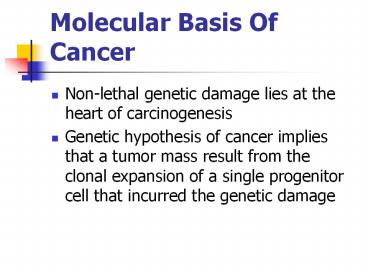Molecular Basis Of Cancer - PowerPoint PPT Presentation
Title:
Molecular Basis Of Cancer
Description:
Molecular Basis Of Cancer Non-lethal genetic damage lies at the heart of carcinogenesis Genetic hypothesis of cancer implies that a tumor mass result from the clonal ... – PowerPoint PPT presentation
Number of Views:496
Avg rating:3.0/5.0
Title: Molecular Basis Of Cancer
1
Molecular Basis Of Cancer
- Non-lethal genetic damage lies at the heart of
carcinogenesis - Genetic hypothesis of cancer implies that a tumor
mass result from the clonal expansion of a single
progenitor cell that incurred the genetic damage
2
Types of Normal Cellular Genes
- 3 Normal regulatory genes
- - Growth promoting protooncogene
- -Growth inhibiting tumor suppressor gene
- -Gene regulate apoptosis
- 4th--? DNA repair gene
3
Normal cell growth
- Any external stimuli leads to stimulation of
growth by growth stimulating gene called - Proto-oncogene
- This should be stopped by gene which will control
the growth called - Tumor suppressor gene
- Any mutated gene will be either repaired by DNA
repair gene or killed by gene called apoptosis
gene
4
(No Transcript)
5
Principles of Carcinogenesis
- Neoplastic transformation is a progressive
process involving multiple hits or genetic
changes. - Alterations in DNA cause changes in one or more
of the following types of genes - Proto- oncogenes
- Tumor suppressor genes
- Genes regulate apoptosis
- DNA repair genes
6
(No Transcript)
7
Tumor Development and Growth
- Transformation
- Growth of transformed cells
- Invasion of tumor cells into the surrounding
tissues - Metastasis of tumor cells to distant sites
8
Hallmarks of Cancer
Six fundamental changes of cell Physiology
- Self sufficiency in growth factors
- Insensitivity to growth-inhibitory signals
- Evasion of apoptosis
- Limitless replicative potential
- Sustained angiogenesis
- Ability to invade and metastasize
9
(No Transcript)
10
(No Transcript)
11
30 OF ALL TUMORS
12
(No Transcript)
13
(No Transcript)
14
(No Transcript)

